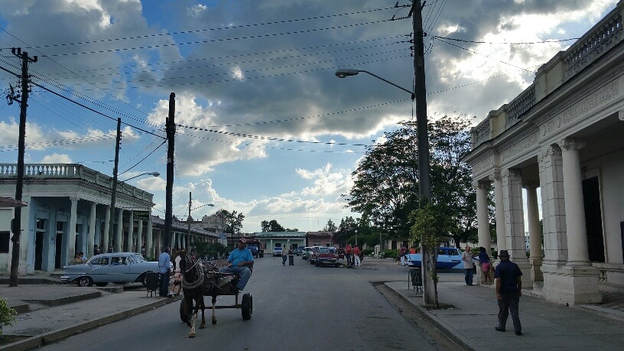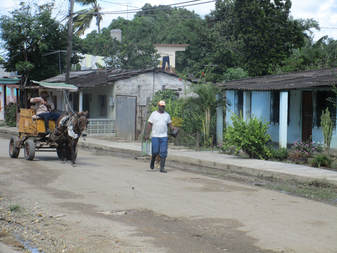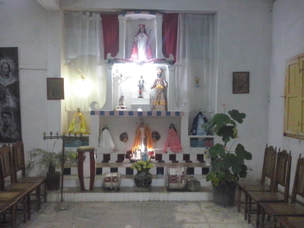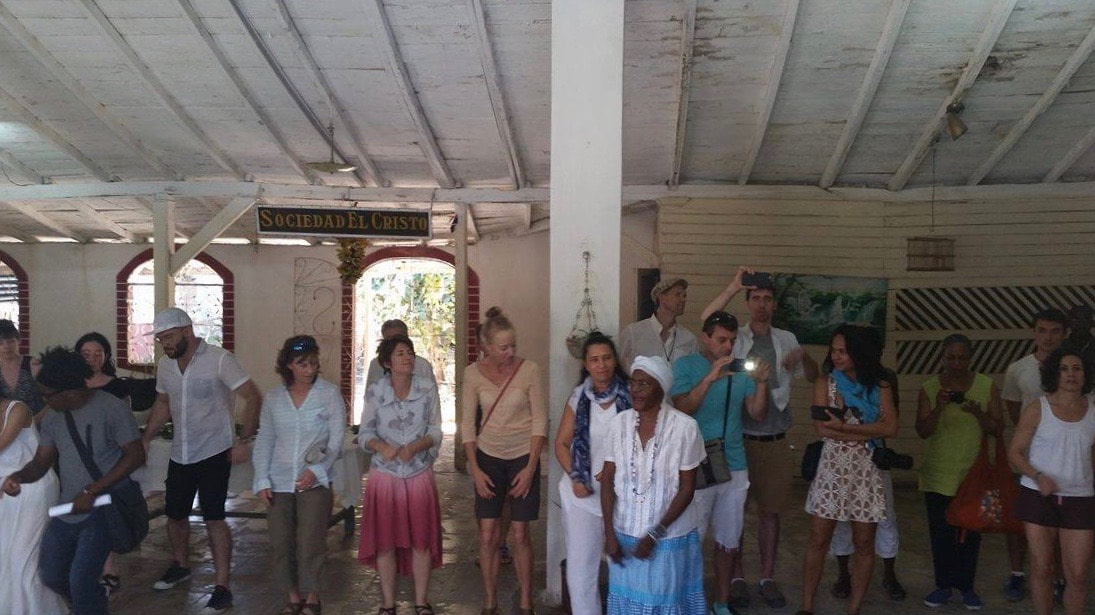Over the past few years, it's become more and more common for foreigners to travel to Cuba to make Ocha (be initiated into the religion). The primary reason for most people is that "it's a lot cheaper to make Ocha in Cuba than it is in the USA (or Europe, or Canada, or elsewhere)." People are attracted to Cuba as one of the epicenters of the religion and to the exotic appeal of the tropics. They may also have a godparent or friends who have connections in Cuba, who encourage them to do their ceremonies there. Today, I want to look at some of the pros and cons of making Ocha in Cuba, so anyone who's contemplating this step has an idea of what to expect. My advice to anyone who's thinking of going to Cuba for religious ceremonies is: Know what you're getting into, and make sure it's the best choice for you.
First, a disclosure...

I'm speaking from the point of view of a person who was initiated in Cuba, and as a person who takes godchildren to Cuba for religious ceremonies. Our community is located in Palmira, Cienfuegos, Cuba, on the southern coast. It's a small town, but one very rich in heritage. Three significant Lucumí religious societies were created there in the 1910s: Sociedad el Cristo, Sociedad San Roque, and Sociedad Santa Bárbara. For more than 100 years, these societies have remained in the hands of the descendants of the founding mothers and fathers (who were born in Africa and brought to Cuba in the 19th century as enslaved people). Knowledge and traditions have been passed down from grandparent to parent to child without interruption, making Palmira not only a town of religious significance in Cuba and the world, but also a place where tradition has been carefully maintained over time, and teaching has been done in the time-honored way, in person, through oral instruction, and through the example set by elders.
The experiences people have in Havana or Matanzas might be very different than my experiences in Palmira. The "countryside" is more traditional, slower to change, and more isolated from outside influences than large cities on the northern coast. Yet, with an increase in tourism, travel, migration, and access to social media and cell phones, Palmira is quickly becoming part of a global network that offers religious services to foreign visitors. Whenever an outsider comes into a poor community, there's the temptation to raise prices to meet consumer demand. The influx of money from outsiders who come seeking religious services is changing (to some extent) the nature of religious interaction between Cubans and foreigners, in small towns as well as larger cities. This imbalance of economic power between Cubans and foreigners creates a minefield of potential problems.
Although my own experiences in Cuba have been completely positive and I'm delighted to take my godchildren there to do ceremonies, I'm also very aware that other people have NOT had good experiences in Cuba. I've seen and heard of numerous cases of people feeling disappointed and confused by their experiences in Cuba and by what happens afterward, upon returning home.
The key to making it work for you is to weigh the pros and cons and come up with an informed decision.
The experiences people have in Havana or Matanzas might be very different than my experiences in Palmira. The "countryside" is more traditional, slower to change, and more isolated from outside influences than large cities on the northern coast. Yet, with an increase in tourism, travel, migration, and access to social media and cell phones, Palmira is quickly becoming part of a global network that offers religious services to foreign visitors. Whenever an outsider comes into a poor community, there's the temptation to raise prices to meet consumer demand. The influx of money from outsiders who come seeking religious services is changing (to some extent) the nature of religious interaction between Cubans and foreigners, in small towns as well as larger cities. This imbalance of economic power between Cubans and foreigners creates a minefield of potential problems.
Although my own experiences in Cuba have been completely positive and I'm delighted to take my godchildren there to do ceremonies, I'm also very aware that other people have NOT had good experiences in Cuba. I've seen and heard of numerous cases of people feeling disappointed and confused by their experiences in Cuba and by what happens afterward, upon returning home.
The key to making it work for you is to weigh the pros and cons and come up with an informed decision.
Start by asking yourself some questions
1. What's your primary reason for wanting to go to Cuba for your ceremony? If the main reason is to save money, think again. Making Ocha is a lifelong commitment, and it's not the time to be bargain shopping. You may save some money doing the ceremony in Cuba, but you may end up spending more in the long run because you'll be expected to travel back on a yearly basis to keep up your religious obligations. Where you make Ocha is your religious HOME, and if your home is very far from where you live, you're potentially creating a hardship for yourself. Think about how well you'll function without a community close at hand. Think about future interaction with your religious family. You're not "done" when you finish the ceremony. Making Ocha is just the beginning of your lifelong experience.
2. Are you fluent in (Cuban) Spanish? Chances are slim that the people working your ceremony are going to be fluent in English, so if your Spanish isn't up to par, you're going to have a hard time understanding what's happening, what's said to you, even simple instructions can become a problem if you don't have good language skills. If you don't know Spanish, do you have a translator who will be with you all the time to translate what's said to you? Is the translator very skilled? Especially when it comes to understanding your itá (advice given during the initiation ceremony), you do NOT want a translator who makes mistakes. The more you understand what's said to you, the more meaningful the experience will be, and the more successful the outcome.
2. Are you fluent in (Cuban) Spanish? Chances are slim that the people working your ceremony are going to be fluent in English, so if your Spanish isn't up to par, you're going to have a hard time understanding what's happening, what's said to you, even simple instructions can become a problem if you don't have good language skills. If you don't know Spanish, do you have a translator who will be with you all the time to translate what's said to you? Is the translator very skilled? Especially when it comes to understanding your itá (advice given during the initiation ceremony), you do NOT want a translator who makes mistakes. The more you understand what's said to you, the more meaningful the experience will be, and the more successful the outcome.

3. Do you have a realistic idea of what living conditions are like in Cuba? Cuba is an underdeveloped country, and many of the people in our religion are poor people. Their homes are clean, but they may cook over a charcoal stove in the back of the house, the toilet may need to be flushed by dumping a bucket of water into it, there probably won't be screens on the windows, so you'll see flies (and mosquitos) inside the house, chickens in the back yard, a pig pen in the neighbor's yard, horse manure in the street, and stagnant water pooled in the gutters. It's hot, and not everyone has air conditioning. There's not a lot of variety in food. Transportation is problematic. If you've never been to Cuba before, and never visited underdeveloped countries, you may not feel comfortable in this environment. Even Cubans who have a higher than normal standard of living are not going to be able to offer you luxury accommodations. Are you prepared to rough it?
4. Who do you know in the religious community in Cuba? And how well do you know them? Be aware that there are good people and bad people in the religion, just as there are in life. If you or your godparent are working with people you don't know well, and you don't have solid references about them, you could end up with frauds who cheat you out of your money. This is a sad reality. There are Cubans who live by fleecing tourists, and if they perceive you don't know what you're doing, you're fair game. At the same time, there are many hard-working, honest, knowledgeable, helpful and sincere people in the religion in Cuba. So, make sure you know who you're working with, and what their backgrounds are. At the very least, you should talk to other members of their religious community to see what kind of reputation they have, spend time observing them, see how they treat their other godchildren. Find out about their lineage, and how much experience they have in the religion.
Pros

1. If you connect with a good community in Cuba, know the people well, are fluent in Spanish and comfortable in the culture, you have the potential to create a wonderful, lifelong connection to that community and those people. Cubans are generous, warm, friendly, welcoming. They're serious about the religion and committed to preserving tradition. They have knowledge. You can learn a lot from them, if you have time and ability to visit often and eventually work ceremonies with them.
2. It CAN be cheaper to do ceremonies in Cuba, but be sure you know everything that's included in the cost, and what (if anything) you're expected to bring with you. Calculate the cost of travel into your experience and, if you are expected to pay the travel costs of your godparent, remember to figure that in, as well. Will you need to have a rental car? Pay for pick up and drop off at the airport? Buy food for people? Is the presentation to the drum included? Don't hesitate to ask about what's included in the price.
3. Being part of an old, established lineage in Cuba can be richly rewarding if you're given access to the knowledge and experience of elders from that community. The elders are like walking encyclopedias whose knowledge isn't found in books or online. Spending time with them is an immense privilege.
2. It CAN be cheaper to do ceremonies in Cuba, but be sure you know everything that's included in the cost, and what (if anything) you're expected to bring with you. Calculate the cost of travel into your experience and, if you are expected to pay the travel costs of your godparent, remember to figure that in, as well. Will you need to have a rental car? Pay for pick up and drop off at the airport? Buy food for people? Is the presentation to the drum included? Don't hesitate to ask about what's included in the price.
3. Being part of an old, established lineage in Cuba can be richly rewarding if you're given access to the knowledge and experience of elders from that community. The elders are like walking encyclopedias whose knowledge isn't found in books or online. Spending time with them is an immense privilege.
Cons

1. If you connect with the wrong people, your experience will be bad. They might cheat you out of money, perform fraudulent ceremonies, or abandon you after they finish with you, cutting you off from the possibility of ever having a community in Cuba. If they're only out to make money from the religion, they won't teach you anything, or nourish the relationship with you. You'll be on your own.
2. If your only reason for going to Cuba is to save money, you may find that your bargain ceremony wasn't really what you wanted. If you don't understand what was said to you, if no one explains anything to you, and you left without any feeling of connection to the people who worked your ceremony, then any money you saved must be weighed against what you got in return. If it was just a commercial exchange, you really didn't benefit from it.
3. If your godparent lives in Cuba, you might not have frequent and easy access to them when you need them. Discuss plans for how to stay in touch, and set realistic expectations about what the godparent will teach you, when and how you'll learn, and what kind of expectations they have about you as a godchild. Find out how often you're expected to visit, and if they have internet and cell phone service so they can communicate with you. If you're expected to put minutes on their cell phone in order to stay in touch, make sure you understand that before you leave Cuba. Do you have a language in common so you can talk without a translator? Without clear communication, you're in for disappointment.
2. If your only reason for going to Cuba is to save money, you may find that your bargain ceremony wasn't really what you wanted. If you don't understand what was said to you, if no one explains anything to you, and you left without any feeling of connection to the people who worked your ceremony, then any money you saved must be weighed against what you got in return. If it was just a commercial exchange, you really didn't benefit from it.
3. If your godparent lives in Cuba, you might not have frequent and easy access to them when you need them. Discuss plans for how to stay in touch, and set realistic expectations about what the godparent will teach you, when and how you'll learn, and what kind of expectations they have about you as a godchild. Find out how often you're expected to visit, and if they have internet and cell phone service so they can communicate with you. If you're expected to put minutes on their cell phone in order to stay in touch, make sure you understand that before you leave Cuba. Do you have a language in common so you can talk without a translator? Without clear communication, you're in for disappointment.
The final decision...
In the end, there are no guarantees of how anything will turn out. But, the likelihood that you'll have a good experience in Cuba is greater if you've given careful thought to the issues I've raised here, and have come up with some concrete reasons why it will benefit you to do your ceremony in Cuba rather than your home town. If you have no community near you, you'll have to travel somewhere in order to find a godparent and get involved with the religion. Give thought to where that place should be. If Cuba seems like a good option, go for it! But, be realistic and know that there are pros and cons to everything, and that you have to go beyond the typical tourist experience in order to become part of a religious community there. Maybe your first few trips to Cuba SHOULD be as a tourist, to observe and learn. If you find a community where you feel at home, you can always go back. There's nothing wrong with tourism, as long as you're respectful and open to learning from people who may be very different from you. As with most things in life, however, it's important to take time to get to know people and see how much in sync you are. Take small steps, and don't commit until you have a good understanding of what the expectations are on both sides. Choose wisely so you don't regret your decision later on.

 RSS Feed
RSS Feed
